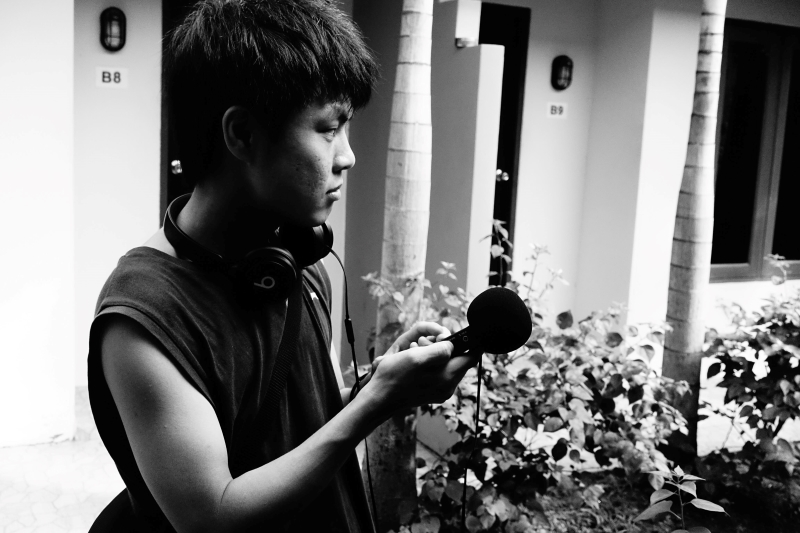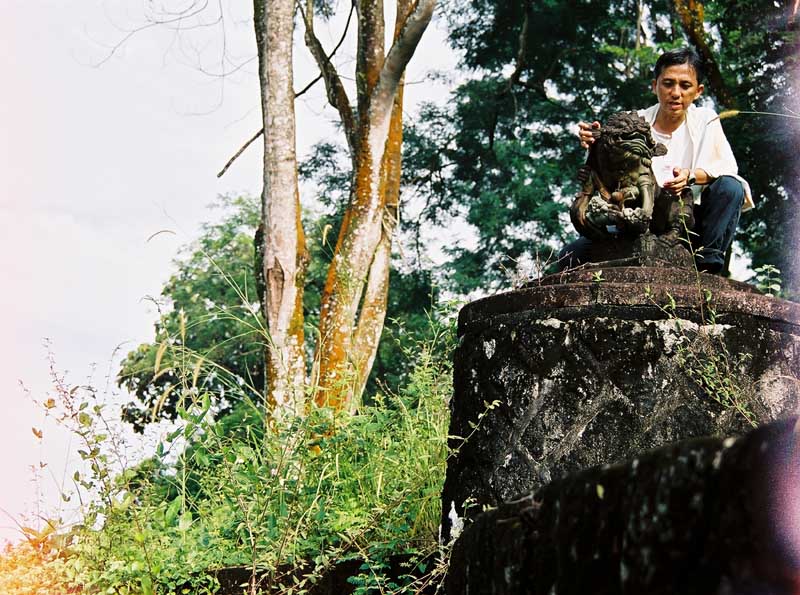
The six films packed under Taiping’s Shorts are good take-off points for discovery (All photos: Raintown Film Festival)
Jacky Yeap Swee Leong has clear reasons for organising the inaugural Raintown Film Festival (RFF) and naming it as such. “There is no separating Taiping and the wet weather. It rains almost every afternoon.”
He left his birthplace after secondary school but wanted to go back and start his filmmaking career there. However, it had no movie community and he did not know how to begin. So the scriptwriter-cum-director made Kuala Lumpur his base.
When Yeap’s debut film Sometime, Sometime hit the cinemas in August 2023, Deputy Minister of Education and Member of Parliament for Taiping Wong Kah Woh said the town would be celebrating its 150th anniversary this year and asked him to do something to mark the occasion.
“So I stepped out of my comfort zone for this. I had joined Pesta Filem Kota Bharu last year and found it important to have a film fest where the community can explore local works instead of having to travel to the main cities to attend one.”
RFF (Sept 13-15), is helmed by a company registered under the event name, but residents, local-born creatives working in other states and visitors have stepped forward to make it happen. Funding came from various quarters, among them Parlimen Taiping and Da Huang Pictures, where Yeap, who studied cinematography at Universiti Malaysia Sarawak, interned and was mentored by filmmaker Tan Chui Mui.
director_photo_2.jpg

He hopes RFF will allow audiences to discover the story of Taiping, its history, culture, landscape and beauty, and explore the place through different experiences. Its line-up of four features shot in the town and the nearby fishing village of Kuala Sepetang, as well as six films packed under Taiping’s Shorts, are good take-off points for discovery.
What most people do not know, he says, is the quiet town boasts many historical firsts — from its prison to the public library, clock tower, museum and railway station. What interests him most are the many local tales not documented on any official platform. These are passed on orally from one person to the next, “and the versions keep changing. Some are beginning to sound like folklore”.
Fact or fiction, Yeap is all for filmmakers uncovering and piecing together local accounts of once-upon-a-time and “delivering them in a way that makes complex narratives with rich historical backgrounds easy for people to understand”.
The films lined up for RFF are set to do that, besides showing Taiping’s development and transformation over the last two decades. Cantonese drama Rain Town (2023), directed by Tunku Mona Riza, centres on a stern father who sees his family unravel after a series of conflicts. In Ho Yuhang’s Rain Dogs (2006), Tung sets out to reconnect with his older brother in KL, unaware of the pitfalls that lie ahead.
ah_kew_the_digger_by_khoo_eng_yow_1.jpg

In the documentary Ah Kew the Digger, field historian and folklorist Lee Eng Kew explores temples and graveyards to trace lineage and record oral history. Sun-J Perumal’s debut feature Jagat, the top winner at the 2016 Malaysian Film Festival, will close the festival. It is about a spirited 12-year-old caught between his uncompromising father and criminal uncle, and the larger community of estate workers facing tough times after the rubber plantations close.
Also on the programme are a workshop (Everyone Can Be a Director! conducted by Kent Tan), film talk “Inspiring Local Stories through Documentaries” (Ansell Tan and Gabrielle Lee) and Q&A session with directors Isyraqi Yahya, Tham Wai Fook and Sun-J.
An outdoor attraction is P Ramlee’s Seniman Bujang Lapok, which will be screened at the Taiping Lake Gardens Raintree Walk car park.
Yeap, 32, says there has been a noticeable increase in art and culture events in his hometown, which started with its first short film competition in 2022, followed by the Raintree Art Market last year. “Compared to five or 10 years ago, Taiping is becoming more energetic, with more young people returning to start their careers in different fields.”
It looks like rain does not dampen artistic enthusiasm, with youngsters like him spreading their wings in new directions. “I’m also exploring other media, including art exhibitions, projection mapping... anything as long as it allows me to express myself.”
Retracing Kinta Valley’s forgotten track to prosperity
Local stories often provide clues about how people used to live and work. Keeping them alive helps those who come later understand the social and economic circumstances of a particular time and place, and how they can be strengthened and utilised for town planning or branding, says documentary filmmaker and director Ansell Tan. The story he wants to tell on Sept 14 at Taiping’s Raintown Film Festival is tied to its history and heritage.
People bombarded with foreign stories on social media nowadays often try to duplicate what they hear and see from other countries and cultures, Tan observes. “Those are found everywhere. We try to tell local stories, so people can draw inspiration from elements uniquely found here and nowhere else.
“Ipoh is gaining attention as a tourist destination, but people tend to forget about the larger narrative of how the rise and fall of Kinta Valley’s tin mining industry was inseparable from the city,” which was placed No 6 on Lonely Planet’s Best in Asia 2016 destinations.
Tan’s documentary, The Forgotten Railway of Kinta Valley, traces the Ipoh-Tronoh branch line that served the tin mines from 1908 to 1948. Part of the Federated Malay States Railways, it was 24km long and passed through Menglembu, Lahat, Papan, Pusing, Siputeh and Tronoh and was instrumental to the prosperity of the valley, once known as the “pioneer of Malaysia’s modern development”.
untitled-1.jpg

But many today do not know it existed or was the busiest railway line in Malaya, says Tan, 36, a Filipino-Chinese who moved from Singapore to Ipoh, his wife’s hometown, five years ago.
After the tin industry collapsed in 1980, there was an exodus: People left for jobs elsewhere and a generation grew up without their parents. This explains the “disconnect and lack of local familiarity with their hometown”.
Ipoh, once the centre of the world’s largest tin mining industry, was like a city that had lost its soul: It became largely irrelevant to the outside world. But with its Top 6 ranking, “people realised there is something appealing to visitors that the locals haven’t quite figured out. This prompted a soul-searching of sorts. We have met more people in their thirties and forties who returned or migrated to Ipoh in search of an alternative lifestyle closer to their families.”
For this independent filmmaker, a high point while documenting the old tracks in Kinta Valley was meeting the father-in-law of an interviewee who witnessed the railway being dismantled some 80 years ago. She had never heard him mention it before, which emphasises what Tan believes: “Stories only come to life when people talk about them.
“We need to have conversations and develop relationships with real people. We must investigate what was thoughtfully recorded, compiled and curated. Surprisingly, we found more useful information from sources and archives in Singapore, the UK and Australia than Malaysia.”
A happy discovery was that the railway once provided free rides to all students in the six tin mining towns, so they could access better education in Ipoh. “Apart from the tin ore it carried, we believe it was the infrastructure for creativity and knowledge that contributed to the city’s development.”
Tan plans to screen his documentary annually in Ipoh and the said towns “so teachers and students may remember this piece of history”. Producing the story of the forgotten railway was never just about itself, but also an introduction to Ipoh, Kinta Valley and the rise and fall of tin mining in Perak.
“Times have changed, and I believe we shouldn’t go back to the ‘glory days’ of relying heavily on the export of natural resources. We need to find ways to nurture and retain human resources, and heritage, arts and culture have a role to play in this.”
The Raintown Film Festival runs from Sept 13 to 15 at Paragon Cinemas, Taiping Mall. Admission is free. For more information, see here.
This article first appeared on Sept 9, 2024 in The Edge Malaysia.


